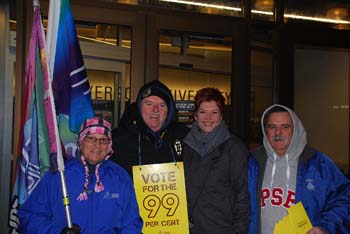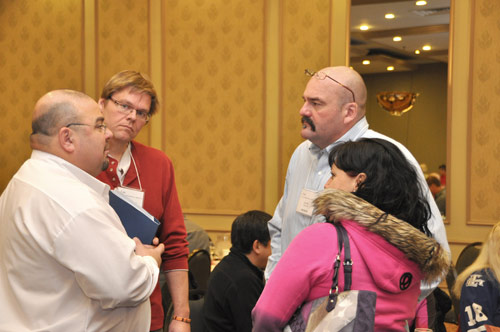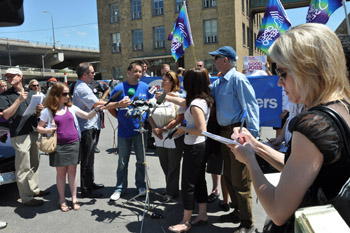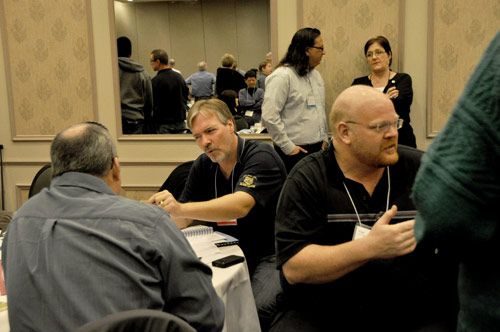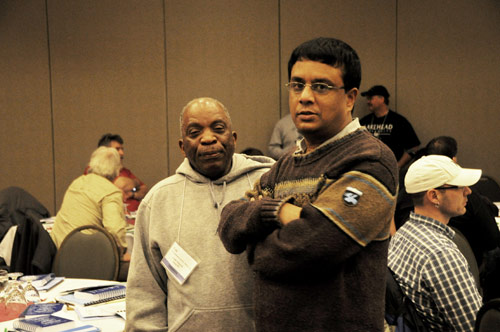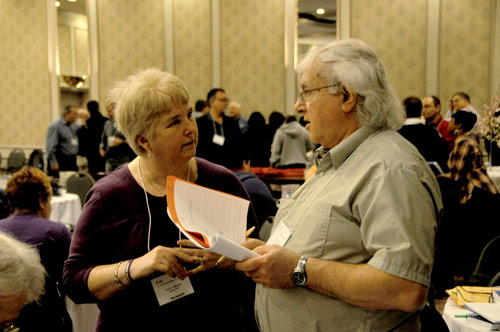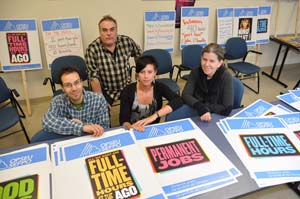Election readiness frames 2011 BPS Conference
Politics was the dominant theme of this past weekend’s BPS Conference and divisional meetings in Toronto as more than 600 delegates, alternates and staff gathered to discuss methods to promote OPSEU’s program of full public services in advance of the Oct. 6 provincial election.
“With the provincial election less than four months away, today is a day about politics,” OPSEU President Warren (Smokey) Thomas told delegates in his prepared text at Friday’s opening plenary. “Politics matter. Politics influence the way we live our lives as communities; it influences the way we live our lives as individuals.
“In the case of OPSEU members, politics affect what work we do, how we do it, how we are paid for it and how it is paid for.”
The President was especially critical of the failure of the provincial Liberals or Conservatives to commit to sending representatives to a special Town Hall meeting that had been planned for Friday afternoon. Both parties had sent a representative to the last BPS conference in 2009.
“Unfortunately two of the main parties were unable to provide us with a representative who was capable of handling the questions that 600 top union leaders from across Ontario might ask.
“This is outrageous, of course, but I have to stay I can hardly blame them. I am sure Dalton McGuinty doesn’t want to listen to anyone suggesting that cutting the wages of working people is bad economic policy.”
OPSEU First Vice-President / Treasurer, Eddy Almeida, struck a similar theme.
“If you listen to McGuinty or Hudak, they say that driving down wages, cutting jobs and cutting funding for public services is the way to help Ontarians. We know that’s nothing but a load of bull.
“As you move forward in the months ahead of us, as you take your message to the politicians and the public that you will not accept cuts, you will be doing more than fighting the right-wing agenda in this province. You will show others, through your actions, that it is possible to make change.
Friday’s two-part plenary opened with OPSEU political economist, Randy Robinson, walking delegates through an informative session titled “How did we get here and where are we going? during which he explained the global and national economic and political forces behind the provincial government’s determination to reduce public spending on the backs of those in the public sector who deliver programs.
Robinson focused, in part, on the significant influence of the news media to shape public opinion in ways that work against the interest of working people, and how governments seize on this reporting and analysis to fashion anti-worker economic and social policies.
That session was followed the same morning by a presentation from Marc Zwelling, president of Vector Research, who analyzed recent public opinion surveying conducted by his firm showing that in many instances the views of working people are ignored by governments when fashioning public policy.
The afternoon was spent working with delegates on building positive communication messages that frame and deliver the views of working people and organized labour in ways that combat widespread misconceptions of each group in the media, business community and among the general public. The session, led by Zwelling and employing the theme “Words that Hurt … Words that Work” had the goal of preparing delegates to carry OPSEU’s positive message of full public services into this autumn’s election.
In a change of form from previous BPS conferences, and with the forthcoming election in mind, delegates were assigned seating during the plenary based on their home ridings, and not by which sector they work for. This approach had the benefit of mixing delegates together by their constituencies so that they might identify issues and communication strategies on a cross-sectoral basis.
